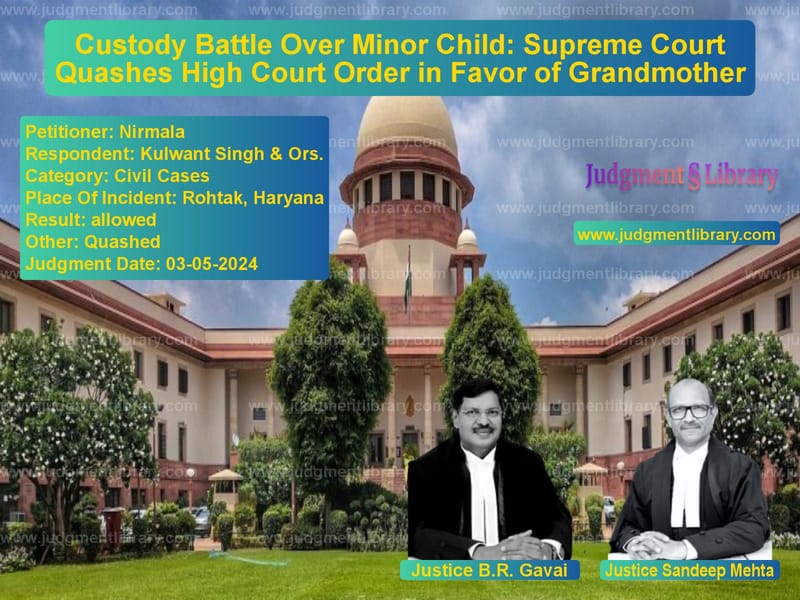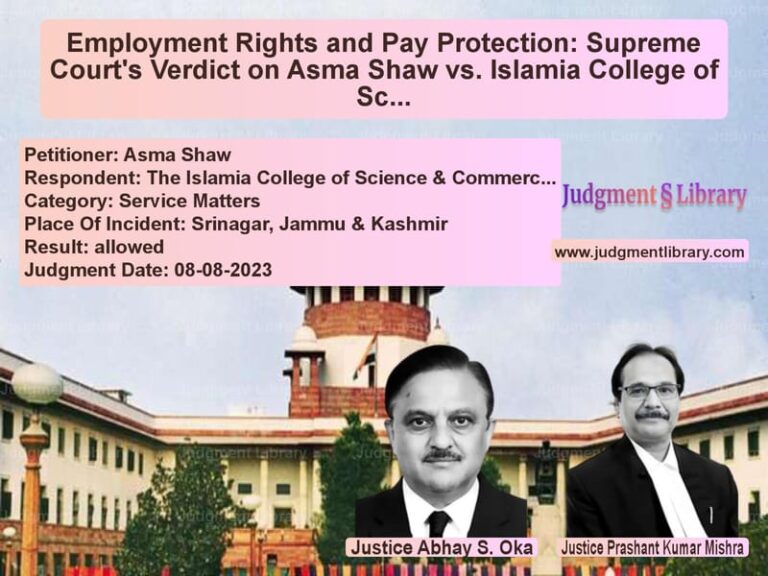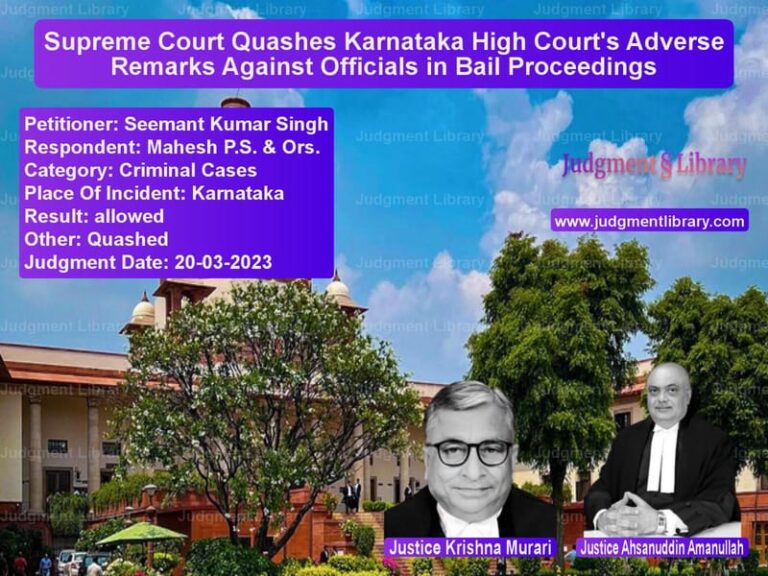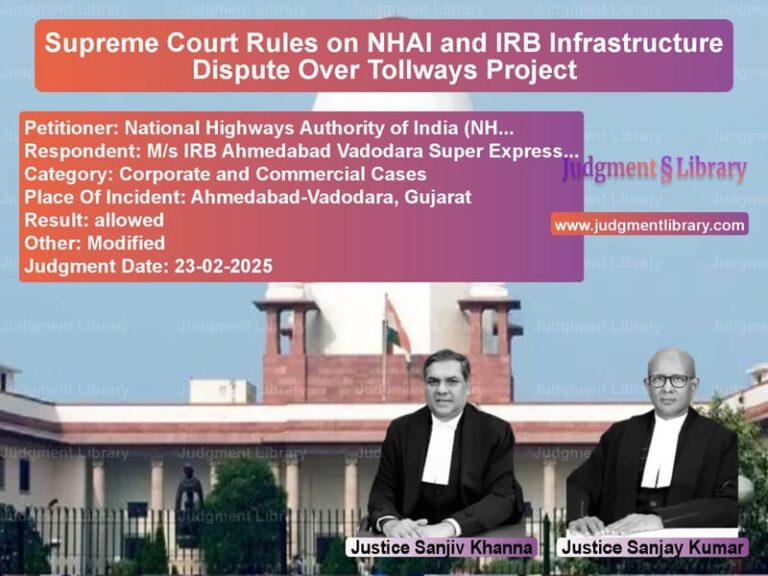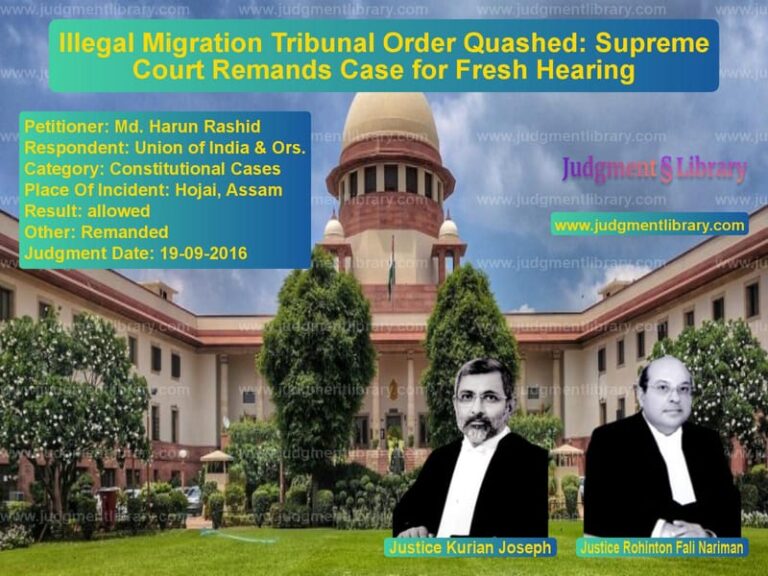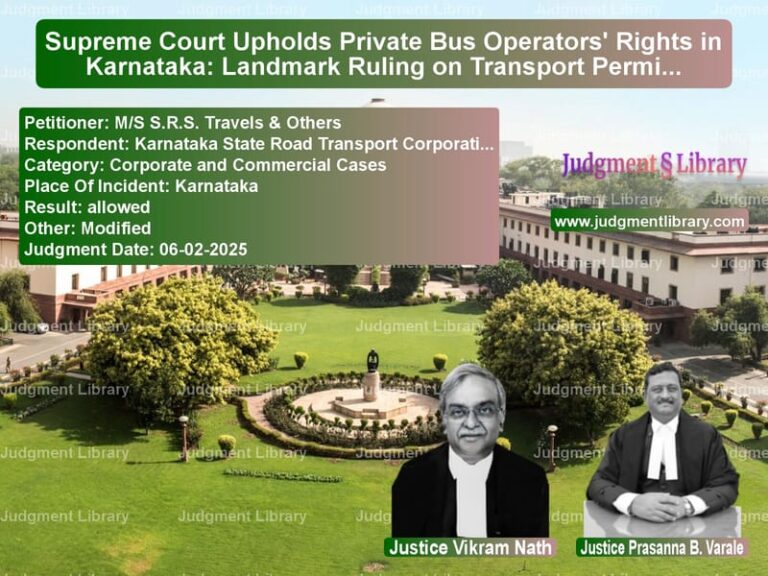Custody Battle Over Minor Child: Supreme Court Quashes High Court Order in Favor of Grandmother
The Supreme Court of India recently delivered a crucial verdict in the case of Nirmala v. Kulwant Singh & Ors., addressing the legal custody of a minor child following the tragic death of the child’s mother. The case was initiated when the biological father sought custody, while the maternal grandmother, who had been raising the child, challenged the move. The judgment provides insight into the legal aspects of child custody, particularly regarding the Guardians and Wards Act, 1890, and the Hindu Minority and Guardianship Act, 1956.
Background of the Case
The case involves the custody of a minor child, Garvit, born on July 5, 2015, to Kulwant Singh (father) and Sangeeta (mother). The couple had married in 2014, but tragedy struck in 2019 when Sangeeta went missing. On April 5, 2019, an FIR was registered under Section 346 of the Indian Penal Code (IPC). The next day, Sangeeta’s father lodged a complaint against Kulwant Singh and his family, alleging harassment.
On April 9, 2019, Sangeeta’s body was found in a canal, leading to the addition of Section 304B IPC (dowry death) to the FIR. However, after an investigation, the police filed a cancellation report in August 2021, indicating that there was no sufficient evidence to proceed against the accused.
During the investigation phase, Kulwant Singh voluntarily handed over his son’s custody to his maternal grandmother, Nirmala. An affidavit dated May 1, 2019, designated her as the child’s guardian and caretaker of a property gifted to the child by his paternal aunt. The child had remained in the grandmother’s care ever since.
Legal Battle Over Custody
In July 2019, the father approached the Child Welfare Committee (CWC), Rohtak, alleging that the grandmother had taken custody through fraud. The CWC ruled in favor of the father on February 5, 2020, declaring the child as “in need of care and protection” under the Juvenile Justice (Care and Protection of Children) Act, 2015, and directed the police to transfer custody to the father.
The grandmother challenged this order before the Additional Sessions Judge, Rohtak, under Section 101 of the JJ Act. The Appellate Court ruled in her favor, overturning the CWC’s order and holding that:
- The child did not fall under the definition of a “child in need of care and protection.”
- The CWC had no jurisdiction to determine the custody of the child.
- The order was beyond the powers of the CWC and thus illegal.
In response, the father filed a Criminal Writ Petition before the Punjab and Haryana High Court, seeking the child’s custody through a Habeas Corpus petition under Article 226 of the Constitution.
High Court’s Decision
On August 23, 2022, the Punjab and Haryana High Court ruled in favor of the father, ordering that the child, who was then 7 years old, be handed over to him. The Court reasoned that:
- The father, as the natural guardian under the Hindu Minority and Guardianship Act, was better positioned to take care of the child.
- The father held a reputed government position and could provide a stable future.
- The child had expressed his willingness to live with both his father and grandmother.
- The grandparents would have visitation rights, allowing them to meet the child at least once a month.
Aggrieved by the decision, the grandmother approached the Supreme Court.
Supreme Court’s Verdict
The Supreme Court, after examining the case, ruled in favor of the grandmother and set aside the High Court’s decision. Key observations included:
- The father had voluntarily handed over custody to the grandmother.
- There was no evidence that the grandmother had taken custody illegally.
- Forcing a 7-year-old child to shift abruptly from his long-term home could cause psychological harm.
- The High Court should not have entertained a Habeas Corpus petition, as the father had other legal remedies available.
The Supreme Court emphasized that in child custody cases, the paramount consideration is the welfare of the child. It cited previous rulings, including:
- Tejaswini Gaud v. Shekhar Tewari (2019) 7 SCC 42 – Stating that Habeas Corpus is only applicable in cases of illegal custody.
- Yashita Sahu v. State of Rajasthan (2020) 3 SCC 67 – Affirming that the welfare of the child is superior to parental rights.
The Supreme Court ruled that:
- The child shall remain in the custody of his grandmother.
- The father is free to file a petition under the Guardians and Wards Act, 1890, to formally claim custody.
- The father shall be granted visitation rights, allowing him to meet the child regularly.
- If the father files for custody, the family court must decide the matter expeditiously.
Conclusion
The Supreme Court’s ruling reinforces the principle that child custody decisions should be based on the best interests of the child rather than strict legal guardianship rules. The case highlights the importance of allowing a child to have stable and nurturing relationships while also ensuring the involvement of both parents and extended family. Future legal proceedings under the Guardians and Wards Act will further determine the best custody arrangement for the child.
Petitioner Name: Nirmala.Respondent Name: Kulwant Singh & Ors..Judgment By: Justice B.R. Gavai, Justice Sandeep Mehta.Place Of Incident: Rohtak, Haryana.Judgment Date: 03-05-2024.
Don’t miss out on the full details! Download the complete judgment in PDF format below and gain valuable insights instantly!
Download Judgment: nirmala-vs-kulwant-singh-&-ors.-supreme-court-of-india-judgment-dated-03-05-2024.pdf
Directly Download Judgment: Directly download this Judgment
See all petitions in Child Custody
See all petitions in Succession and Wills
See all petitions in Specific Performance
See all petitions in Damages and Compensation
See all petitions in Other Cases
See all petitions in Judgment by B R Gavai
See all petitions in Judgment by Sandeep Mehta
See all petitions in allowed
See all petitions in Quashed
See all petitions in supreme court of India judgments May 2024
See all petitions in 2024 judgments
See all posts in Civil Cases Category
See all allowed petitions in Civil Cases Category
See all Dismissed petitions in Civil Cases Category
See all partially allowed petitions in Civil Cases Category

